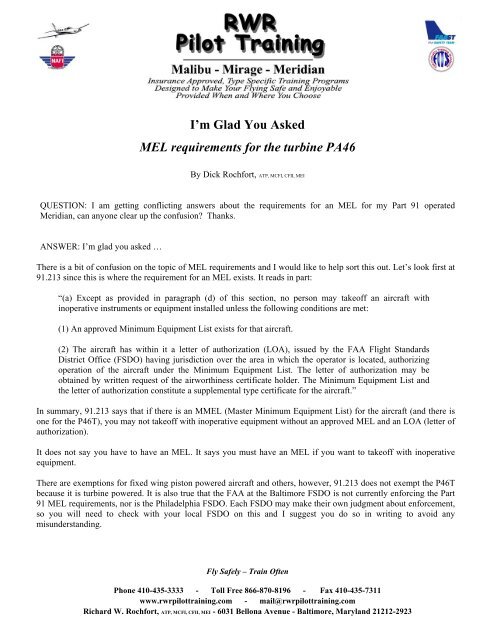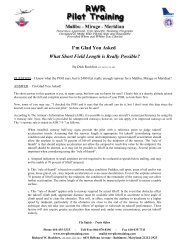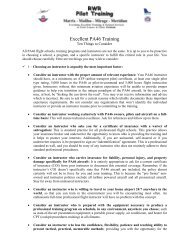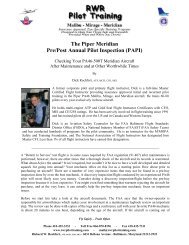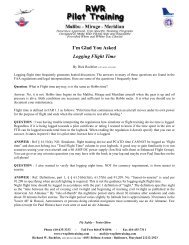MEL - RWR Pilot Training
MEL - RWR Pilot Training
MEL - RWR Pilot Training
Create successful ePaper yourself
Turn your PDF publications into a flip-book with our unique Google optimized e-Paper software.
I’m Glad You Asked<br />
<strong>MEL</strong> requirements for the turbine PA46<br />
By Dick Rochfort, ATP, MCFI, CFII, MEI<br />
QUESTION: I am getting conflicting answers about the requirements for an <strong>MEL</strong> for my Part 91 operated<br />
Meridian, can anyone clear up the confusion? Thanks.<br />
ANSWER: I’m glad you asked …<br />
There is a bit of confusion on the topic of <strong>MEL</strong> requirements and I would like to help sort this out. Let’s look first at<br />
91.213 since this is where the requirement for an <strong>MEL</strong> exists. It reads in part:<br />
“(a) Except as provided in paragraph (d) of this section, no person may takeoff an aircraft with<br />
inoperative instruments or equipment installed unless the following conditions are met:<br />
(1) An approved Minimum Equipment List exists for that aircraft.<br />
(2) The aircraft has within it a letter of authorization (LOA), issued by the FAA Flight Standards<br />
District Office (FSDO) having jurisdiction over the area in which the operator is located, authorizing<br />
operation of the aircraft under the Minimum Equipment List. The letter of authorization may be<br />
obtained by written request of the airworthiness certificate holder. The Minimum Equipment List and<br />
the letter of authorization constitute a supplemental type certificate for the aircraft.”<br />
In summary, 91.213 says that if there is an M<strong>MEL</strong> (Master Minimum Equipment List) for the aircraft (and there is<br />
one for the P46T), you may not takeoff with inoperative equipment without an approved <strong>MEL</strong> and an LOA (letter of<br />
authorization).<br />
It does not say you have to have an <strong>MEL</strong>. It says you must have an <strong>MEL</strong> if you want to takeoff with inoperative<br />
equipment.<br />
There are exemptions for fixed wing piston powered aircraft and others, however, 91.213 does not exempt the P46T<br />
because it is turbine powered. It is also true that the FAA at the Baltimore FSDO is not currently enforcing the Part<br />
91 <strong>MEL</strong> requirements, nor is the Philadelphia FSDO. Each FSDO may make their own judgment about enforcement,<br />
so you will need to check with your local FSDO on this and I suggest you do so in writing to avoid any<br />
misunderstanding.<br />
Fly Safely – Train Often<br />
Phone 410-435-3333 - Toll Free 866-870-8196 - Fax 410-435-7311<br />
www.rwrpilottraining.com - mail@rwrpilottraining.com<br />
Richard W. Rochfort, ATP, MCFI, CFII, MEI - 6031 Bellona Avenue - Baltimore, Maryland 21212-2923
Page 1 of 3Page 1 of<br />
3<br />
If you decide to create an <strong>MEL</strong> for your aircraft look first at the FAA M<strong>MEL</strong>:<br />
http://www.rwrpilottraining.com/PA46P91.DOC<br />
The M<strong>MEL</strong> is the document you should use to develop your own <strong>MEL</strong>.<br />
I have a developed a <strong>MEL</strong> for the PA46-500T and it is posted on my website in Microsoft Word format:<br />
http://www.rwrpilottraining.com/<strong>RWR</strong>PT_%20Meridian_<strong>MEL</strong>.doc<br />
You are welcome to use this one if you like, although you will need to address any equipment differences. Once you<br />
have done so, fax the <strong>MEL</strong> to your local FSDO with a request for an LOA, and then place these documents in your<br />
POH. That's all there is to it.<br />
Download the FAA Op Spec as well. It will help you with knowing how to proceed.<br />
http://www.rwrpilottraining.com/FAA_OP_Spec_PL-036_R02.pdf<br />
The <strong>MEL</strong> requirement is in addition to the Kinds List in your POH which affects airworthiness. It is also in addition<br />
to the requirements of 91.205, although there is significant overlap. Make sure you consider these items when<br />
developing your <strong>MEL</strong>.<br />
If you are unsure about these regulations, have questions or need help, feel free to give me a call.<br />
I hope this information is helpful.<br />
Fly Safely – Train Often<br />
Dick Rochfort, ATP, MCFI, CFII, MEI<br />
410-435-3333<br />
mail@rwrpilottraining.com<br />
www.rwrpilottraining.com<br />
“I’m Glad You Asked” is a regular column written by Master Flight Instructor Dick Rochfort. Dick answers<br />
questions which come up frequently while conducting training in the Malibu, Mirage and Meridian aircraft. If you<br />
have a question for Dick, you can send it to him at mail@rwrpilottraining.com. He’ll be … “glad you asked”.<br />
Fly Safely – Train Often<br />
Phone 410-435-3333 - Toll Free 866-870-8196 - Fax 410-435-7311<br />
www.rwrpilottraining.com - mail@rwrpilottraining.com<br />
Richard W. Rochfort, ATP, MCFI, CFII, MEI - 6031 Bellona Avenue - Baltimore, Maryland 21212-2923
Page 2 of 3Page 2 of<br />
3<br />
____________________________________________________________<br />
Biography<br />
Richard W Rochfort<br />
A former corporate pilot and primary flight instructor, Dick is a full-time Master Certified<br />
Flight Instructor providing insurance approved initial and recurrent pilot training in the Piper<br />
PA46 Malibu, Mirage, and Meridian aircraft. He is currently flying over 450 hours per year<br />
and trains 60-80 pilots every year exclusively in these aircraft.<br />
He holds multi-engine ATP and Gold Seal Flight Instructor Certificates with CFII, MEI and<br />
CE-525S ratings. He has been actively involved in flight training since 1991 and has trained<br />
pilots all over the US, Canada and Europe.<br />
Dick is an Aviation Safety Counselor for the FAA Baltimore FSDO, a National Industry<br />
Member of the FAA Safety Team (FAAST) and has conducted hundreds of programs for the<br />
pilot community. He is an instructor for the M/MOPA Safety and <strong>Training</strong> Foundation and The National<br />
Association of Flight Instructors has designated him Master CFI. Less than 1% of all flight instructors have earned<br />
this designation.<br />
Dick served as a Staff Sergeant E6 in the US Army Special Forces from 1970 until 1976 as an A team radio<br />
operator, training indigenous personnel in field communications. He worked from 1976 until 1991 as an industrial<br />
engineer training manufacturing personnel for the production of communication and navigation equipment for US<br />
military.<br />
His education includes undergraduate degrees in Clinical Psychology and Engineering and a Masters Degree in<br />
Business Administration. Dick lives in Baltimore, Maryland with his wife and two daughters. He is a PADI<br />
Certified Scuba Diving Instructor, First Aid Instructor and an Eagle Scout.<br />
____________________________________________________________<br />
Fly Safely – Train Often<br />
Phone 410-435-3333 - Toll Free 866-870-8196 - Fax 410-435-7311<br />
www.rwrpilottraining.com - mail@rwrpilottraining.com<br />
Richard W. Rochfort, ATP, MCFI, CFII, MEI - 6031 Bellona Avenue - Baltimore, Maryland 21212-2923


